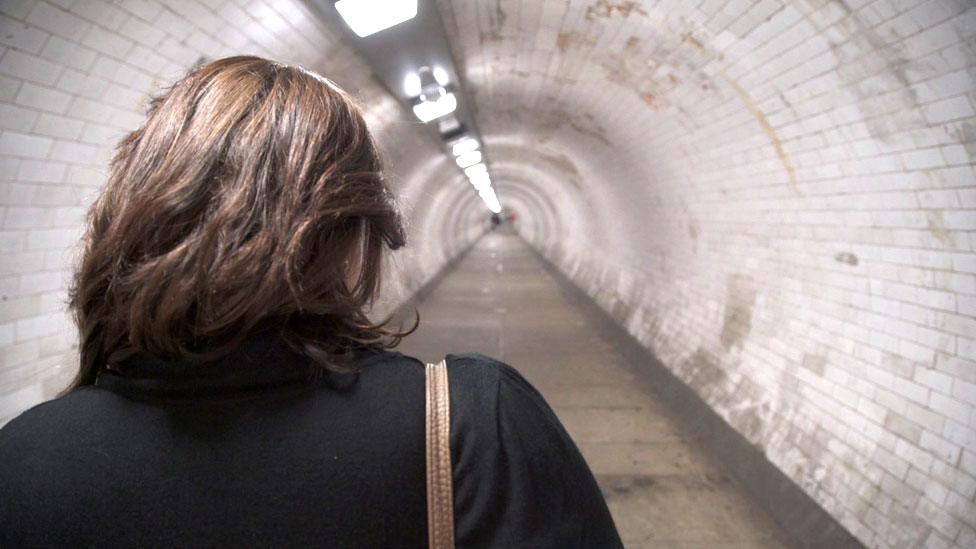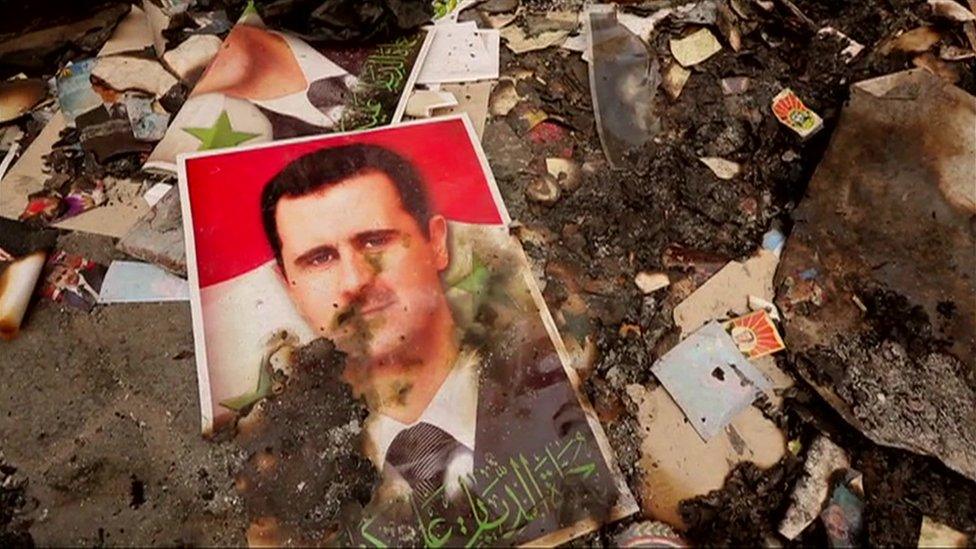'How I was tortured in a Syrian jail'
- Published
"Farah" speaks of the torture she endured - This testimony contains details some viewers may find disturbing
"Farah" was born in Britain but grew up in Syria. Last year, she was arrested by the Syrian government security forces, who accused her of being an opposition activist. She blames Syrian President Bashar al-Assad for the torture that followed, and sees him as a bigger menace than Islamic State.
Warning: Some readers will find Farah's story disturbing
"My best friend was detained one year before me, so she told me all about it, but it was much worse than what she said.
"The first thing I saw… there were all men hanged up, some of them were really bleeding from their backs and from their legs. They were just shouting, it was really scary."
She was kept in a squalid, dark and cold room with about 12 other women.
During interrogations, she was beaten.
"They hit you and they ask you the question, if you don't answer they hit you more. You get to that stage when you're numbed - they can see that you're not in pain - so they'll take you, put water on you - and then they'll do it another time."


Find out more
You can listen to Secunder Kermani's radio report on the Today programme on Saturday 5 December from 07:00, or catch up afterwards on iPlayer.

On one occasion she was tortured with electrodes.
"I fainted - so I didn't feel the pain like when they used to hit me," she says. But she remembers clearly "the fear" before the event.
One of the other girls in the same cell as her said she was raped. Farah didn't see this, but was threatened with rape herself.
"Not just rape, but gang rape," she says.
Farah believes that she was spared even worse treatment because she was a dual UK-Syrian national - the guards nicknamed her "British" even when they were insulting her. But they tortured her psychologically as well as physically.
Sometimes they threatened to bring Farah's young son to the detention centre. "I used to go crazy when they used to say that. That was the hardest thing… Inside they know who are your closest people - they know everything."
One incident, when a guard tortured an elderly man in her presence, sticks out in her mind.
"He was just in front of me and they put him under electrocution. I had to see. I'm sure the man died. He just fell on the floor, and they carried him and threw him out of the room," Farah says.
"One time they hanged a man from his legs and hands. I tried not to see, but sometimes they hold your face to see. They were pulling the ropes… They split him. Until now I remember his voice shouting, and then suddenly I couldn't hear anything."
Amnesty International wrote in a report last month that "torture" and "extrajudicial execution" are "rampant" in detention centres. The Syria Network for Human Rights also estimates that 65,000 people, mostly civilians, were forcibly "disappeared" by the government between March 2011 and August 2015, and remain missing. The Syrian government rejects allegations of abuses.

Prison staff weren't always brutal, Farah says.
"When the detective is there no-one can help you. But after (the interrogation) they will give you medication or feed you."
One night a guard started a conversation with Farah.
"I told him, 'how can a normal person do what you're doing to us?' He opened a drawer and got some pills out and told me because of these - these help me… He started telling me, 'You're in prison? I'm in prison. I've been here for four years hitting people.'"
Farah was released after 36 days although she's still not sure why. She left Syria and came to the UK.
She holds Syrian President Bashar al-Assad responsible for what happened to her.
The UK recently began airstrikes against so-called Islamic State in Syria, but Farah says the priority should be the Assad regime not IS.
Her views echo those of many Syrians caught between Assad and IS.
"When we say we want to get rid of Assad it doesn't mean we want ISIS - or we are happy with ISIS. In a way they are both the same, just with different ways of killing," Farah says.
"Assad is the one who brought ISIS to Syria with all his death and destruction. We have to get rid of Assad and then we can get rid of ISIS."

More from the Magazine
When Islamic State seized Palmyra in Syria in May, one of the first things it did was blow up the Tadmur prison - the country's most notorious jail, where for decades, political dissidents were detained and tortured. "Jailers were given an open licence to do anything, even to kill. Your life was simply worth nothing," says Palestinian writer Salameh Kaileh, who spent two years there, from 1998 to 2000.
Inside Tadmur: The worst prison in the world?
Subscribe to the BBC News Magazine's email newsletter to get articles sent to your inbox.